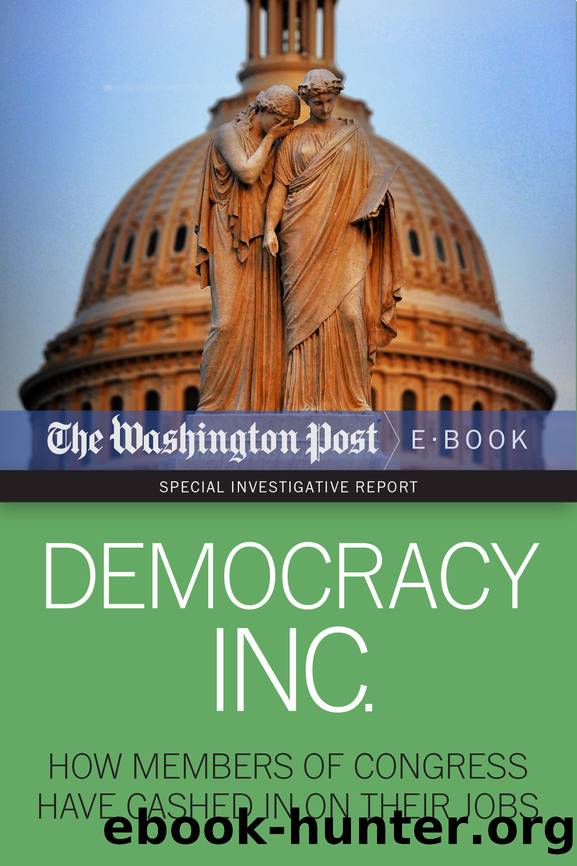Democracy Inc.: How Members of Congress Have Cashed In On Their Jobs by The Washington Post

Author:The Washington Post
Language: eng
Format: epub
Tags: POLITICAL SCIENCE/Government/General
Publisher: Diversion Books
Published: 2013-02-11T00:00:00+00:00
Researcher Bobbye Pratt contributed to this article.
Congressional rules on trading had their start in 1789
By Kimberly Kindy
June 23, 2012
A Founding Father, a federal bailout and the press were at the center of the only documented congressional insider trading case in U.S. history.
It was 1789, and state-backed revolutionary war bonds had become virtually worthless. Treasury Secretary Alexander Hamilton moved in to shore up the investments.
Before word spread, members of Congress secretly scooped up thousands of the bonds from unsuspecting farmers and war veterans, paying pennies on the dollar.
What followed set the stage for how Congress would respond to public outrage over such conflicts of interest for the next 200 years.
In response to the scandal, lawmakers prohibited Hamilton and future Treasury secretaries from buying or selling government bonds while in office.
But members of Congress did not extend the ban to themselves, a pattern that persists to this day.
âCongress has no problem imposing rules on others. We have a more difficult time doing it for ourselves,â said former representative Brian Baird (D-Wash.), who in 2006 co-authored the original Stock Act that called for greater financial disclosure about lawmakersâ stock trades.
In its ethics rules, Congress presents a twofold argument for why it creates different rules for itself than it does for federal judges and the executive branch officials.
First, Congress views itself as a âcitizen legislature.â As such, lawmakers think their investment portfolios should mirror those of their constituents: The farm belt is best represented by farmers, who should serve on agriculture committees. Oil-rich states are best represented by oilmen, who should serve on energy committees.
The second argument for the disparate rules is that members of Congress are elected officials, while other federal workers are not. If voters think a lawmaker is too deeply conflicted, they can vote him or her out of office.
Congressional ethics experts say this logic is outdated.
âThe problem now is Congress has become much more specialized. The chairman of the banking committee, for example, represents not just his state, but all of us,â said Dennis Thompson, an expert on congressional ethics and a public policy professor at Harvard University. âBut unless I live in that congressmanâs state, I donât get the chance to vote him out.â
The modern conflict-of-interest laws came in response to the Watergate scandal, prompting Congress to pass the 1978 Ethics in Government Act.
Again, the rules were far stricter for the executive branch than for Congress. The act created the public financial disclosure form, requiring members of Congress, their staffs and those in the executive branch to annually disclose most of their assets but reveal their dollar value only in broad ranges.
Download
This site does not store any files on its server. We only index and link to content provided by other sites. Please contact the content providers to delete copyright contents if any and email us, we'll remove relevant links or contents immediately.
The Secret History by Donna Tartt(16762)
The Social Justice Warrior Handbook by Lisa De Pasquale(11517)
Thirteen Reasons Why by Jay Asher(7856)
This Is How You Lose Her by Junot Diaz(5844)
Weapons of Math Destruction by Cathy O'Neil(5094)
Zero to One by Peter Thiel(4885)
The Myth of the Strong Leader by Archie Brown(4820)
Promise Me, Dad by Joe Biden(4493)
Beartown by Fredrik Backman(4489)
How Democracies Die by Steven Levitsky & Daniel Ziblatt(4465)
Stone's Rules by Roger Stone(4455)
The Fire Next Time by James Baldwin(4398)
100 Deadly Skills by Clint Emerson(4128)
A Higher Loyalty: Truth, Lies, and Leadership by James Comey(4073)
Rise and Kill First by Ronen Bergman(4062)
The David Icke Guide to the Global Conspiracy (and how to end it) by David Icke(3934)
The Farm by Tom Rob Smith(3908)
Secrecy World by Jake Bernstein(3828)
The Doomsday Machine by Daniel Ellsberg(3772)
